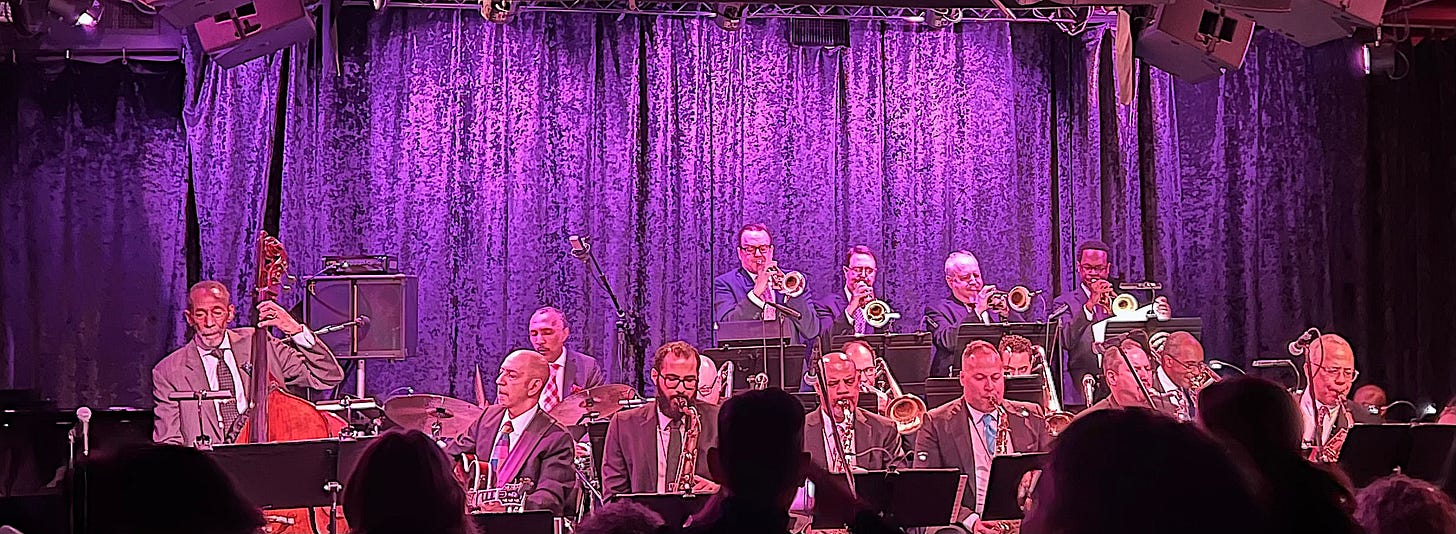Steppin' Out: RON CARTER AT BIRDLAND
The best bassists drive the band, most jazz musicians will tell you. Great bassists rev the tempo and headlamp the harmony. They make the music thrum.
I found myself marveling at this, anew, as I listened to the greatest living jazz bassist, the ageless Ron Carter, kick his “Great Big Band” into gear at Birdland recently. I’ve heard Ron Carter in many settings over the years but never leading a big band. Now that I have, it’s going to be hard to listen to any other big band without feeling, retrospectively, Mr. Carter’s everlasting pulse.
His career now spans more than sixty years and 2,000-plus recordings, though his name will always be associated with the Miles Davis Quintet that he joined in 1963 at the age of 26. The music made with Miles over a period of just six years, from 1963-1968 (alongside pianist Herbie Hancock, drummer Tony Williams and saxophonist Wayne Shorter) so revolutionized jazz that it tends to overshadow Ron Carter’s extensive ongoing achievements.
An expansive sampling of those achievements was on display during a just-ended month-long residency at Birdland that included duets with the pianist Bill Charlap; a new Ron Carter trio — supplanting the sudden loss this summer of guitarist Russell Malone; Carter’s “Foursight Quartet;” and the “Great Big Band” he’s convened periodically since 2011.
One doesn’t think of Ron Carter as a big band bassist, given his quintessence in the Davis Quintet, but he proved, unsurprisingly, a superb driver of his band’s sixteen pieces. The group, like its leader, grooved with an effortless elegance. The arrangements were rarely showy but they were gorgeously intricate, demanding consummate virtuosity.
The evening opened with “For Toddlers Only,” a Ron Carter original, in a Rich DeRosa arrangement that gently but forcefully swung — or, rather, was swung by Mr. Carter’s bass. A quick-stepping “Caravan,” so willfully un-Duke Ellington-like in Robert M. Freedman’s arrangement, showcased the band’s alto saxes led by David DeJesus, riffing off their leader’s sinuous bass strokes. Dizzy Gillespie’s “Con Alma,” another Freedman arrangement, was delivered at a stately tempo that made way for Carter to carve through it in a contrapuntally Latinate solo. “Cut and Paste,” another Carter original and another DeRosa chart, had the martini-dry kick of a Thad Jones/Mel Lewis Village Vanguard Orchestra pour, with Carter’s bass lines flitting like cracked ice in a shaker.
In each instance, the bass drove the band via entirely different modes, depending upon the tune. No two tunes seemed to possess the same bass engine.
Big band aside, the evening’s highlight, inescapably, was a Ron Carter spotlight, all alone, on “You Are My Sunshine” that took his instrument into every possible crevice of bass expression — walking bass, throbbing Bo Didley beats, but also hushed fret-alone fingering – a display of artistry that was simplicity itself.
In the end, I found myself thinking of the jazz giants who have come and gone and the handful that we have left, like Ron Carter. If you have any doubts about the Great Person lineage of jazz — the singular impact of giants on this great American music — well, just listen. And learn. Ron Carter is still here.




